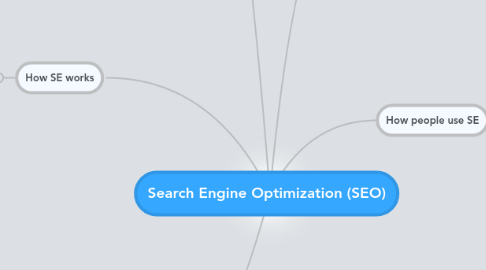
1. How SE works
1.1. Providing answers
1.1.1. Search results are based on: 1. Relevant /Useful 2. Rank result in order of perceived usefulness
1.2. Crawling & Indexing
1.2.1. Once engines finds the pages that has the keywords searched by users,the crawlers/spiders decipher code and store selected pieces in massive hard drives, to be recalled later when needed for a search query.
1.2.1.1. Search Engine data centre has been set up all over the world to hold billions of pages to be accessed in a fraction of a second. The storage facilities hold thousands of machine processing large quantities of information.
1.2.1.1.1. Hence, when a person perform a search, they demand results immediately. This is how search engines helps to provide answers.
2. Basics of SE friendly design & development
2.1. Indexable Content
2.1.1. Most important content: 1. HTML text format 2. Images in png, jpg format assigned "alt attributes" in HTML. 3. Search boxes supplemented with navigation & crawlable links 3. Flash/Java plug-in contained content supplemented with text on page 4. Video & Audio accompanying transcript if the words & phrases used are meant to be indexed by the engines.
2.2. Crawlable Link Structures
2.3. Keywords usage & targeting
2.4. Keyword domination
2.4.1. Keyword Abuse
2.4.2. On-page optimization
2.5. Title tags
2.6. Meta tags
2.7. URL structures
2.8. URL construction guidelines
2.9. Canonical & duplicate version of content
2.10. Defending your sites honor
3. SEO Strategies
3.1. Keyword Research
3.1.1. How to judge value of keyword.
3.1.1.1. Search for the term/phrase in major engines
3.1.1.1.1. Understand which website already rank for your keywords fives a valuable insight in the competition
3.1.1.2. Buy a sample campaign for the keyword at Google AdWords and/or Bing Adcenter
3.1.1.3. Using the data you've collected determine the exact value of each keyword
3.1.2. Growing Popularity & Links
3.1.2.1. Link signals
3.1.2.1.1. Used by search engines
3.1.2.1.2. Global popularity
3.1.2.1.3. Local/Topic-specific popularity
3.1.2.1.4. Anchor Text
3.1.2.1.5. TrsutRank
3.1.2.1.6. Link neighbourhood
3.1.2.1.7. freshness
3.1.2.1.8. Social sharing
3.1.2.2. Link building basic
3.1.2.2.1. "Natural" Editorial links
3.1.2.2.2. Manual "Outreach" link building
3.1.2.2.3. Self-created, non-editorial
3.1.2.3. Metrics
3.1.2.3.1. Ranking for relevant search term
3.1.2.3.2. Competitor's backlinks
3.1.2.3.3. SEOmoz mozRank
3.1.2.3.4. Domain Authority
3.1.2.3.5. Number of links on a page
3.1.2.3.6. Potential Referral Trafic
3.1.2.4. Sample of links building strategies
3.1.2.4.1. Get your customer to link to you
3.1.2.4.2. Build company blog
3.1.2.4.3. Create contents that inspire viral sharing & natural ranking
3.1.2.4.4. Be newsworthy
3.1.2.4.5. Find directories or listing of relevant resources
3.1.2.5. Show me the money
3.1.2.5.1. An aside on buying links
4. How people use SE
4.1. Build your users, not SEs
4.1.1. User
4.1.1.1. bad experience at your site
4.1.1.1.1. Poor SE performance
4.1.1.2. Happy with your website
4.1.1.2.1. Positive experience created
4.2. Types of search quesries
4.2.1. Transactional Queries
4.2.1.1. Action queries
4.2.1.1.1. Eg. buy tickets
4.2.1.1.2. Eg. Listen song
4.2.2. Informational Queries
4.2.2.1. User seek information
4.2.2.1.1. Eg. name of the band
4.2.2.1.2. Eg. the best restaurant in Sg
4.2.3. Navigation Queries
4.2.3.1. Seek particular online destination
4.2.3.1.1. Eg. Facebook
4.2.3.1.2. Eg. Homepage of the NFL
4.3. Empathy your audience
4.3.1. Effectively reach & keep users
4.3.1.1. Grasp
4.3.1.1.1. average searcher
4.3.1.1.2. target market
4.3.1.1.3. is looking for
4.4. Primary responsibility
4.4.1. Serve relevant results to users
5. How SE determines importance?
5.1. SE determines importance based on popularity.
5.1.1. The more popular a site/page/document/means: The more valuable information contained.
